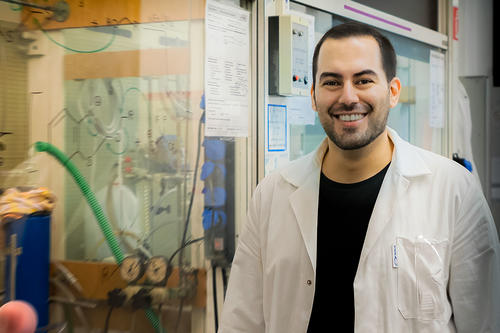Research for the Future
Armin Ariamajd, a student at Freie Universität, is a recipient of a DAAD Prize for outstanding international students
Nov 23, 2021
Armin Ariamajd says his mother was his greatest supporter and “a great source of inspiration.” Armin is picutred here in Prof. Matthew Hopkinson’s laboratory at Freie Universität.
Image Credit: Michael Jakob
Armin Ariamajd never has time. That is very understandable, as he is currently enrolled in two master’s degree programs at the same time, chemistry and computational science, both at Freie Universität. In November 2021 the German Academic Exchange Service (DAAD) recognized him for his outstanding achievements as an international student at a German university as well as for his commitment to intercultural work and helping society.
Armin grew up in the Iranian capital Tehran. His mother, who teaches German language and literature at the University of Tehran, introduced him to German culture at an early age. She sang German children’s songs with him and read to him from novels such as Erich Kästner’s Emil and the Detectives. Later she taught him about German writers, scientists, and philosophers. He says that knowing so many great thinkers came from Germany was a major motivation for him to continue his studies here.
Moved to Berlin in 2012
After graduating from secondary school in Tehran, Armin began to learn German at the Goethe Institute there. His newly acquired language skills enabled him to move to Berlin in 2012, where he started at the Studienkolleg, the preparatory college for international students wishing to study at Freie Universität. Immediately after completing the preparatory program, he started the bachelor’s degree program in chemistry, a subject that had long fascinated him. He finds it intriguing the way chemistry overlaps with other fields, such as physics and biology.
Getting started in Germany was not easy. On the one hand, the separation from family and friends in Tehran was difficult, and besides that, getting used to a new life in a foreign country, studying a new subject, and speaking a new language brought challenges every day. “Even though I had already learned German in advance and had the required language certificate, there were still a lot of technical terms that you don’t learn in language lessons. I had to look words up all the time in order to be able to follow the lesson,” says Armin. “Basically, I had eight hours of classes every day and then needed another eight hours to understand what I had just learned.” There was also a lot to organize.
Helps Others to Get Settled
After overcoming these hurdles and getting settled in Germany, Armin wanted to share his experiences and help other international students when they arrive in Germany. He started to volunteer, tutoring children from refugee families. In 2018 he became a mentor in the “Buddy Program” of Freie Universität.
“To have someone who has gone through the same process and is able to share their experiences with you and accompany you on your way would have been a great help to me when I was new here. That’s why I always do my best to help other newly arrived students to settle in in Germany,” says Armin Ariamajd.
Interface between Chemistry and Computer Science
After completing his bachelor’s degree, he decided to enroll in two master’s programs at the same time. In addition to chemistry, he chose computational sciences for his second degree. Armin thinks future developments will take place at the intersection of these two subjects. He says, “I think that in this decade we will see a major change in the way science is done, so that most experiments are carried out by specialized robots and the theoretical part is mainly taken over by artificial intelligence and specialized algorithms.”
He would like to combine his two master’s theses in a larger project devoted to “computer-aided drug development,” i.e., the simulation of a large part of the scientific discovery phase, for example, for drugs for the treatment of diseases. “Instead of performing time-consuming and resource-intensive experiments, these are simulated digitally, which means that the same results can be achieved much faster and more cost-effectively,” explains Armin. “However, the field is still very young and needs a lot of improvement before it can completely replace the current experimental drug discovery process. I hope to be able to contribute to that.”
Plans to Donate the Prize Money
In his application for the DAAD Prize, Armin stated that he would donate the prize money if he won. He has not yet decided on an organization, but his biography indicates what he intends. He says, “I’m looking for a rather young organization to support young people with less privileged backgrounds on their way to higher education, for example, through free tutorials and advice.”
Armin Ariamajd says he owes most of his success “directly or indirectly” to his mother. “She has always been my greatest supporter and a great source of inspiration for me. Without her, I would probably not be where I am now. Although she was very busy at work, she put a lot of time and effort into teaching me as much as she could.”
For the German version, see the article in campus.leben.
Further Information
The recipients of the second-place prize this year include:
- Eleanor Fox (born in Sheffield, UK), master’s student in the biochemistry program
- Paulo Coelho Ditzel (born in Rio de Janeiro, Brazil), master’s student in the biodiversity, evolution, and ecology program
- Ginevra Giacomello (born in Italy), doctoral candidate in pharmacy, working under Professor Maria Kristina Parr

